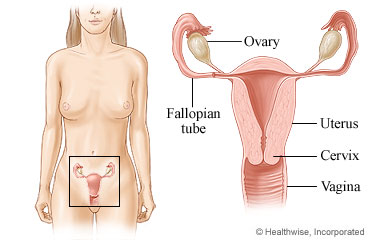
Your Recovery
A hysteroscopy is a procedure to find and treat problems with your uterus. It may have been done to remove growths from the uterus. Or it may have been done to diagnose or treat fertility problems. It can also be used to diagnose or treat abnormal bleeding.
You may have cramps, discharge, or light vaginal bleeding for several days after the test. This may last longer if the hysteroscopy was used for treatment. If the doctor filled your uterus with air, your belly may feel full. You may also have shoulder pain right after the procedure.
This care sheet gives you a general idea about how long it will take for you to recover. But each person recovers at a different pace. Follow the steps below to get better as quickly as possible.
How can you care for yourself at home?
 Activity
Activity
- Rest when you feel tired.
- You can do your normal activities when it feels okay to do so.
- You may shower and take baths as usual.
- Ask your doctor when it is okay for you to have sex.
 Diet
Diet
- You can eat your normal diet. If your stomach is upset, try bland, low-fat foods like plain rice, broiled chicken, toast, and yogurt.
- If your bowel movements are not regular right after surgery, try to avoid constipation and straining. Drink plenty of water. Your doctor may suggest fiber, a stool softener, or a mild laxative.
 Medicines
Medicines
- Your doctor will tell you if and when you can restart your medicines. You will also be given instructions about taking any new medicines.
- If you take aspirin or some other blood thinner, be sure to talk to your doctor. Your doctor will tell you if and when to start taking this medicine again. Make sure that you understand exactly what your doctor wants you to do.
- Be safe with medicines. Take pain medicines exactly as directed.
- If the doctor gave you a prescription medicine for pain, take it as prescribed.
- If you are not taking a prescription pain medicine, ask your doctor if you can take an over-the-counter medicine.
- Do not take two or more pain medicines at the same time unless the doctor told you to. Many pain medicines have acetaminophen, which is Tylenol. Too much acetaminophen (Tylenol) can be harmful.
- If your doctor prescribed antibiotics, take them as directed. Do not stop taking them just because you feel better. You need to take the full course of antibiotics.
 Other instructions
Other instructions
- You may have some light vaginal bleeding. Wear sanitary pads if needed. Do not use tampons until your doctor says it is okay.
- You may want to use a heating pad on your belly to help with pain. Use a low heat setting.
- Talk to your doctor if you want to try to get pregnant soon. They can tell you when it's safe to do so. If you don't want to get pregnant, talk with your doctor about birth control.
Follow-up care is a key part of your treatment and safety. Be sure to make and go to all appointments, and call your doctor if you are having problems. It's also a good idea to know your test results and keep a list of the medicines you take.
When should you call for help?
Call 911 anytime you think you may need emergency care. For example, call if:
- You passed out (lost consciousness).
- You have chest pain, are short of breath, or cough up blood.
Call your doctor now or seek immediate medical care if:
- You have pain that does not get better after you take pain medicine.
- You cannot pass stools or gas.
- You have vaginal discharge that has increased in amount or smells bad.
- You are sick to your stomach or cannot drink fluids.
- You have signs of infection, such as:
- Increased pain, swelling, warmth, or redness.
- A fever.
- You have bright red vaginal bleeding that soaks one or more pads in an hour, or you have large clots.
- You have signs of a blood clot in your leg (called a deep vein thrombosis), such as:
- Pain in your calf, back of the knee, thigh, or groin.
- Redness and swelling in your leg.
Watch closely for changes in your health, and be sure to contact your doctor if you have any problems.
Current as of: April 30, 2024
Author: Ignite Healthwise, LLC Staff
Clinical Review Board
All Healthwise education is reviewed by a team that includes physicians, nurses, advanced practitioners, registered dieticians, and other healthcare professionals.

